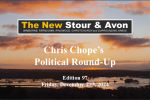Chris Chope's Update on the Owen Paterson Situation
As a former member of the Parliamentary Committee on Standards, I am concerned about the Committee’s disregard for the rules of natural justice for which it is, rightly, under critical scrutiny. It will be at the heart of the debate in the House of Commons next Wednesday into the case of Owen Paterson.
Owen Paterson acted in the public interest by raising with the Government his concerns about the harm caused by milk contamination by a banned and carcinogenic antibiotic, carcinogenic nitrates in ham and bacon and the dangers of poorly calibrated diagnostic equipment in developing countries. Evidence about these issues came to his notice during his work for two companies with which he had a properly registered consultancy. It would have been irresponsible not to have alerted the relevant regulators to these concerns. Yet by so doing, Owen Paterson has been found by the House of Commons Standards Committee to be in breach of the rules about lobbying and advocacy. The key issue is whether, in acting as he did, Owen Paterson was covered by the exemption which provides that ‘In exceptional cases where there is some serious wrong or substantial injustice a Member may approach the responsible Minister or public official even if doing so might incidentally benefit a paying client’.
Whether Owen Paterson is entitled to the benefit of that ‘public interest’ exemption is a fundamental issue. His critics on the Committee at paragraph 27 said that ‘We consider that our predecessor committee intended that the serious wrong exemption would only apply if the relationship between resolution of the wrong and benefit conferred was merely incidental’. Yet the actual words of the exemption are not so limited. The Committee is not entitled to reinterpret its predecessor Committee’s intentions and then apply that reinterpretation retrospectively. It has the power to recommend a narrower interpretation of the exemption for the future but should not be applying that to Owen Paterson’s case.
Such mischief is at the core of the concerns which I and so many colleagues share about this case. Our views are reinforced by the admission of the Commissioner of Standards this September that she had decided on Mr Paterson’s guilt when she sent him her first memorandum in December 2020.
Following that memorandum, Owen Paterson asked the Commissioner to listen to additional evidence about the importance of his whistle blowing in relation to the quality and safety of milk and bacon. In response, the Commissioner said that ‘Such expert evidence is not material to my decision’. Yet on any fair reading of the issues, the extent of the gravity of Owen Paterson’s concerns is fundamental to whether the public interest exemption applies.
The procedural shortcomings in this case extend to the reasoning behind such a disproportionate penalty being recommended. In his oral evidence to the Standards Committee, Owen Paterson expressed the view that ‘my family and I have no doubt that the manner in which this inquiry has been conducted played a massive role in creating the extreme anxiety that led to [Mr Paterson’s wife’s] suicide’. Instead of responding with sympathy and understanding, the Committee described those allegations as ‘extremely serious ones’ but, without adducing any evidence to the contrary, decided that it was an aggravating factor in the case that ‘Mr Paterson has made serious personal and unsubstantiated allegations against the integrity of the Commissioner and her team’. The Committee, after ‘taking into account’ that and other subjective aggravating factors, decided to recommend a wholly disproportionate penalty.
Owen Paterson is no less entitled to the benefit of natural justice than any other citizen of the UK.
- ENDS -

